

Dinosaurs and Denial. Natural disasters not odd coincidences: Column. Like a lot of people, I felt reassured earlier this year when President Obama spoke of the need to combat climate change for the sake of our children.
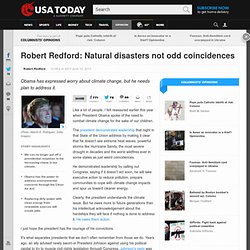
The president demonstrated leadership that night in that State of the Union address by making it clear that he doesn't see extreme heat waves, powerful storms like Hurricane Sandy, the most severe drought in decades and the worst wildfires ever in some states as just weird coincidences. He demonstrated leadership by calling out Congress, saying if it doesn't act soon, he will take executive action to reduce pollution, prepare communities to cope with climate change impacts and spur us toward cleaner energy.
Clearly, the president understands the climate issue. Climate change: Why don't Americans believe in global warming? Climate Change - Building a Green Economy. Why Climate-Change Denial Is So Powerful. Don't believe in global warming? That's not very conservative. Few causes unite the conservatives of the newly elected 112th Congress as unanimously as their opposition to government action on climate change.
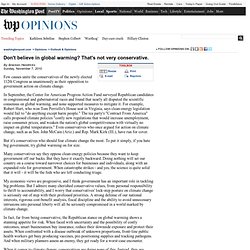
In September, the Center for American Progress Action Fund surveyed Republican candidates in congressional and gubernatorial races and found that nearly all disputed the scientific consensus on global warming, and none supported measures to mitigate it. For example, Robert Hurt, who won Tom Perriello's House seat in Virginia, says clean-energy legislation would fail to "do anything except harm people. " The tea party's "Contract From America" calls proposed climate policies "costly new regulations that would increase unemployment, raise consumer prices, and weaken the nation's global competitiveness with virtually no impact on global temperatures. " Even conservatives who once argued for action on climate change, such as as Sen. OPED - Make climate change a priority. First published in The Washington Post on Thursday, January 24, 2013.
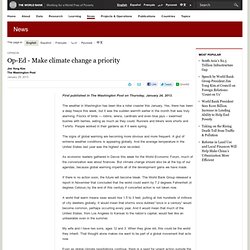
The weather in Washington has been like a roller coaster this January. Yes, there has been a deep freeze this week, but it was the sudden warmth earlier in the month that was truly alarming. Flocks of birds — robins, wrens, cardinals and even blue jays – swarmed bushes with berries, eating as much as they could. Runners and bikers wore shorts and T-shirts.
People worked in their gardens as if it were spring. The signs of global warming are becoming more obvious and more frequent. As economic leaders gathered in Davos this week for the World Economic Forum, much of the conversation was about finances. If there is no action soon, the future will become bleak. A world that warm means seas would rise 1.5 to 3 feet, putting at risk hundreds of millions of city dwellers globally. My wife and I have two sons, ages 12 and 3. A third focus is on cities. An oil tax could be one of the least painful ways to trim the deficit. Like it or hate it, policymakers in Washington are still obsessed with the deficit.
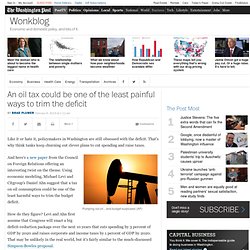
That's why think tanks keep churning out clever plans to cut spending and raise taxes. Pumping out oil... and budget surpluses! (AP) And here's a new paper from the Council on Foreign Relations offering an interesting twist on the theme. Using economic modeling, Michael Levi and Citgroup's Daniel Ahn suggest that a tax on oil consumption could be one of the least harmful ways to trim the budget deficit. How do they figure? Next, the authors look at what would happen if Congress scrapped some of those tax hikes and spending cuts and instead replaced them with a tax on oil consumption. After running their economic model, Levi and Ahn found that using the oil tax to fend off some of the spending cuts and income tax hikes could be beneficial to the U.S. economy. In Variation 1, the gold line, the oil tax is used to restore part of the government spending cuts in the big deficit-reduction deal. To Fight Climate Change, College Students Take Aim at the Endowment Portfolio.
Associated Press Demonstrators in 1978, protesting Harvard’s refusal to divest itself of stocks owned in companies operating in South Africa.
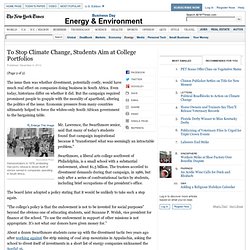
Mr. Smarter Wind Turbines Help Wind Power Compete with Fossil Fuels. Superficially, wind turbines haven’t changed much for decades.

But they’ve gotten much smarter, and considerably bigger, and that’s helped increase the amount of electricity they can generate and lower the cost of wind power. GE’s new 2.5-120 wind turbine, announced last week, is a case in point. Its maximum power output, 2.5 megawatts, is lower than that of the 2.85 megawatt turbine it’s superseding. But over the course of a year it can generate 15 percent more kilowatt hours. Arrays of sensors paired with better algorithms for operating and monitoring the turbine let it keep spinning when earlier generations of wind turbines would have had to shut down.
The technology is part of a trend that’s made wind power almost as cheap as fossil fuels. A new generation of more productive wind turbines that’s coming on line this year could be what it takes to make wind widely competitive with fossil fuels. The biggest impact on electricity production comes from making wind turbines bigger.